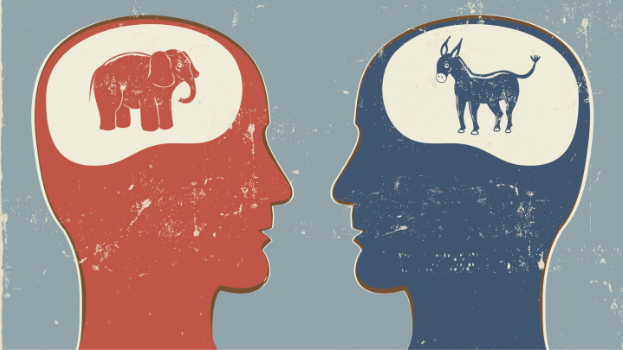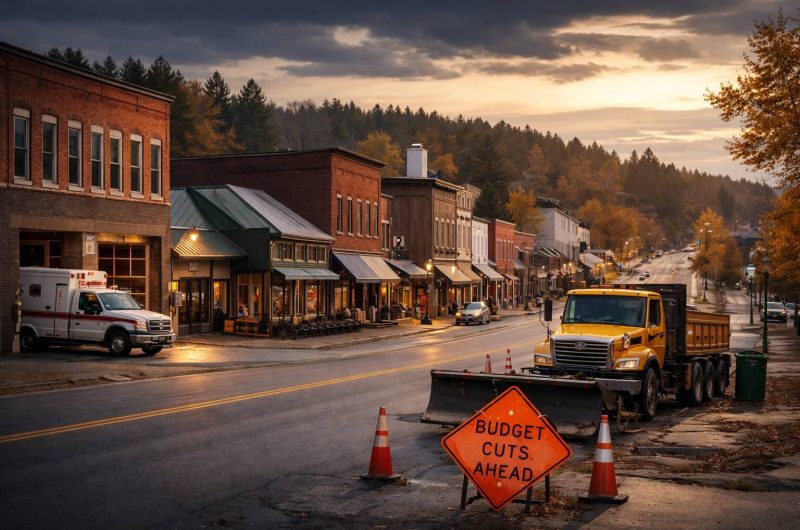For What It’s Worth

We are publishing this article by Katelyn Jasmin, a Research Assistant at the University of Michigan Ford School of Public Policy’s Center for Local, State, and Urban Policy (CLOSUP).
This article is part of a series from the “CLOSE UP on the UP” project, a collaboration between CLOSUP, U-M’s UP Scholars Program, and Rural Insights.
A team of undergraduate students from the UP who attend the University of Michigan are using CLOSUP survey data, with a particular emphasis on the responses from over 130 local governments in Michigan’s Upper Peninsula who respond each survey wave, to look at issues important to their home region and analyze the insights of the UP’s local government leaders.
The Upper Peninsula of Michigan is a fairly secluded place. It’s almost like its own world, often feeling detached from the rest of the country and even from the Lower Peninsula of the same state. We’re so under the radar that non-Michiganders can forget that the U.P. is part of the United States. (That may sound ridiculous, but one of my friends showed me how FOX News’s weather channel did label us once as being part of Canada.)
However, U.P. local officials have something very much in common with those of their mitten-shaped neighbor: concern for the state of democracy.
Overall, many Americans nationwide don’t feel like U.S. democracy is in a good state. According to PBS, citing a poll from The Associated Press-NORC Center for Public Affairs Research, “Only about 1 in 10 U.S. adults give high ratings to the way democracy is working in the United States or how well it represents the interests of most Americans.”
Similarly, the University of Michigan’s Center for Local, State, and Urban Policy (CLOSUP) conducts a regular annual survey that often asks Michigan local officials to assess various issues in their communities around issues of democracy and the functioning of government here in Michigan. Back in 2021, one question focused on the impact of national partisan politics on the relationship between officials and residents and between residents themselves.
The results show that over 50% of both Upper Peninsula and Lower Peninsula officials believe that national partisan politics hurts both these relationships (see Figure 1 below). Half as many (23%) U.P. local leaders think that national politics has no effect on relationships between the community’s elected officials and residents, and only 12% think relations between residents themselves are unaffected by national partisan politics.
Figure 1:
Michigan local officials’ assessments of the effects of national partisan politics on local political relationships (Spring 2021 MPPS)
So, why are most U.P. leaders concerned about the local effects of partisan politics? Well, there could be many reasons, but a primary contender may be the extreme political polarization in the U.S.
Extremist politics is nothing new to this country, but it has increased in the past two decades and with it extremist politicians whose main concern is upsetting the opposing side. Just looking at the campaigns for the upcoming 2024 presidential election, one can see how ugly things have gotten.
In an electoral study published by ScienceDirect, Dalston Ward and Margit Tavits argue that voters’ affective ties to parties (both positive and negative) lead them to perceive the ideological positions of those parties as more extreme and that when voters are “affectively polarized,” their perception of politics and their behavior toward it are altered.
It feels like American politics has become more of a boxing match to decide who’s “right” than a conscientious discussion of different points of view. To me, the American political system was never perfect, but at least it used to make some sense. Now it feels like everything has gone crazy, and possibly with disastrous consequences for the future.
A great example of this is what happened to the Republican Party in Michigan, a state proven to be a crucial swing state in presidential elections. The introduction of the “America First” faction created some conflict within the Michigan GOP. Preaching a ‘if you’re not with us, you’re against us’ ideology, the extreme far right group claimed that all the then-powerful, moderate members of the party were corrupt and needed to be taken out of the picture.
Its leaders made a plan to take up delegate seats so that they could elect their desired candidates to leadership positions in the Michigan GOP, in which they succeeded by electing Kristina Karamo to the party’s chair. Unfortunately, Karamo was more focused on combating the party’s perceived enemies rather than actually running its affairs, and everything crumbled.
The lesson from this incident is clear: politics based solely on extremist ideology is doomed to fail.
Of course, this is a specific case of the impacts of political polarization, but it’s part of a troubling pattern concerning the state of American politics. We’re living through a time where many people view differing ideologies as a disease to be vanquished and anything that contradicts their beliefs as inherently false or corrupt. It’s straining both the political and social relationships. If one wants an example of this, just look at how you can’t bring up political topics to many of your loved ones without starting a fight. Things are getting pretty tumultuous out here, and it’s only going to get uglier as the presidential election gets closer.
However, we don’t have to sit by helplessly as the situation unfolds. There can be many ways to combat political polarization and they’re fairly simple to execute.

Image courtesy of The Monarch.
The Carnegie Endowment for International Peace proposes several ideas for reducing political polarization. This list provides simple ways people can alter their behavior on an individual level to avoid falling into a polarized mindset. The first approach is to practice calling out one’s own party, which I believe is extraordinarily important because a dangerous phenomenon we’re seeing in the U.S. is where politicians are viewed more as idols to be adored rather than what they are: civil servants meant to aid the public.
PennToday released an article about a new research study led by University of Pennsylvania Professor Duncan Watts where he and his collaborators found that fostering a sense of closeness between individuals influences their receptiveness to political arguments. It’s no secret we humans feel more open to new ideas when they’re coming from people we feel more connected with, and this study shows that this can be the case even when the people involved have opposing views. Basically, be kind and friendly to others, and open to disagreement. I know that may sound too simple to actually be a verifiable solution, but remember political polarization is based on hate and dissonance. Take that out of the equation then what you have left are people peacefully sharing their ideas with one another.
Overall, these solutions mainly focus on change needed in our political system or our social relationships.
One that I believe cannot be stressed enough, though, is to question the motivations behind politicians’ words and actions. The main strategy of extremist politicians is to manipulate constituents by convincing them that their beliefs are the one sole truth and that they will uphold this ‘truth’ if they’re elected to office. However, oftentimes extremists don’t really believe much of what they claim and only want the money and power that comes with the position they’re after.
No matter what political affiliation you identify with, if a politician is parroting key beliefs that your party is identified with and claiming your opinions are the only ones that are right, question their intentions. Don’t get caught in an Emperor Palpatine and Anakin Skywalker situation (that’s a Star Wars reference, in case you’re wondering). Actual people aren’t always going to agree with you, and even when they do it won’t be word for word because every person is unique with their own experiences, beliefs, values, and identities that shape their point of views. It’s why I’m personally skeptical of many high-level politicians from both parties and am not a member of either.
There should be no room in American democracy for extremists, and we need to let them know that. If we want to build a better democracy, then we need to fight for a respectful and equitable political system by letting our officials know that we won’t accept belligerent, divisive behavior.
It’s been proven time and time again that if we work together, we can make impactful change.
Look at Ottawa county, it recently had its election for city commission and it was a somewhat contentious affair as the candidates for the Democratic Party, Republican Party, and the resident far-right group “Ottawa Impact” fought for seats. Through a non-partisan collaborative effort, several of the challenging candidates were able to beat the OI incumbents and replace them on the Commission, much to the relief of many people in that community.
Or think back to how Kristina Karamo was voted out of her position as head of the Michigan GOP because moderate Republicans came together and decided what was best for their party was to oust an extremist leader.
There’s a long way to go and a lot of bridges to repair, but the very future of our democracy depends on it, because if we only focus on destroying one another, then we will all fall down.
Let’s stand tall together, eh?
The survey responses presented here are those of local Michigan officials, while this analysis represents the views of the author. Neither necessarily reflects the views of Rural Insights, the University of Michigan, or other partners in the MPPS.







Well written article. About the best that can be done with this subject.
It was the Ottawa COUNTY Commission, not the Ottawa CITY Commission in the election results you referred to.
It is interesting that in this article, all of the “problems” cited reference the republican party or the “far right.” Here we have a perfect example of bias, that might be unintended. Who knows? But if the author was to follow her own suggestion for a solution, she would present a more balanced viewpoint and find an example in which she would question the actions of liberals. There are extremists on both sides of the political spectrum, but somehow we tend to think of extremists only on the far right. Think about it. If you’re asked to name a far-right extremist, you’ll be able to do it without a second thought. When asked to identify a far-left extremist, I bet you won’t come up with a name. And yet, by definition, if there is a “middle” then there has to be an equal right and an equal left. So something is askew with not only our political system and its leaders, but with our inherent system of beliefs. I think the author is approaching this idea, but needs to delve further into its implications.
Nailed it!
I agree with you Sarah…
OUR PURPOSE
Rural Insights strives to accomplish the following things:
Ensure citizens have accurate and nonpartisan information about issues that impact rural life in Michigan’s Upper Peninsula and beyond.
This first rule of Rualinsights.org Re: “Nonpartisan information” was, unfortunately, violated. To be totally unbiased, there should of been examples on the Left as well, both Parties are equally guilty of radical interests…
Sarah Smith is spot-on. She completely ignores the far-left that wants total, or near-total, control of our lives in the name of equity, inclusiveness and “safety”.
For the most part, those on the right want a less intrusive government. Let address abortion before liberal heads explode. The underlying principle of small government versus right-to-life beliefs is defining when a life is human. That is a founding principle and one adherents aren’t likely to ever compromise on.
That difference in philosophy doesn’t give the left any claim to legitimacy wanting exert control over life cradle to grave.
I’d like the author to provide a single example of how polar opposing world views can be resolved peacefully.
I concur with you Robert 👍🏻
Excellent article – thank you for your analysis of a very complex problem in our society.
Tad